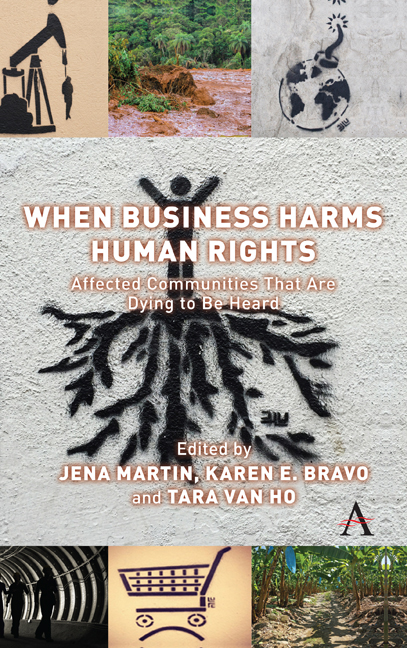Book contents
- Frontmatter
- Contents
- Preface
- Acknowledgements
- Introduction
- Chapter 1 Complicity in False Arrest, Imprisonment and Theft by a Fairtrade-Certified Company
- Chapter 2 Hindrances to Access to a Remedy in Business-Related Cases in Colombia: The Case of Gilberto Torres
- Chapter 3 The Global Pursuit for Justice for DBCP-Exposed Banana Farmers
- Chapter 4 The Rupturing of the Dam and the Community’s Social Fabric: A Testimony from an ‘Atingido’ from Bento Rodrigues, Brazil
- Chapter 5 Taming the Dragon, Unpacking Options for Access to Remedy for Violations by Chinese Multinational Corporations Operating in Chiadzwa, Zimbabwe
- Chapter 6 Máxima Acuña: The Story of How a Business Impacted Human Rights Defenders
- Chapter 7 Community Interrupted, ‘Life Projects’ Disrupted: Cajamarca, Ibagué, and the La Colosa Mine in Colombia
- Chapter 8 Occupational Health as a Human Right: A Case Study in a Turkish Free Trade Zone
- Chapter 9 The Price of the ‘Black Dollar’: Veteran Coal Miners and the Right to Health
- Chapter 10 Abandoned: A Tale of Two Mine Closures in South Africa
- Conclusion
- Appendices
- List of Contributors
- Index
Chapter 10 - Abandoned: A Tale of Two Mine Closures in South Africa
Published online by Cambridge University Press: 20 January 2022
- Frontmatter
- Contents
- Preface
- Acknowledgements
- Introduction
- Chapter 1 Complicity in False Arrest, Imprisonment and Theft by a Fairtrade-Certified Company
- Chapter 2 Hindrances to Access to a Remedy in Business-Related Cases in Colombia: The Case of Gilberto Torres
- Chapter 3 The Global Pursuit for Justice for DBCP-Exposed Banana Farmers
- Chapter 4 The Rupturing of the Dam and the Community’s Social Fabric: A Testimony from an ‘Atingido’ from Bento Rodrigues, Brazil
- Chapter 5 Taming the Dragon, Unpacking Options for Access to Remedy for Violations by Chinese Multinational Corporations Operating in Chiadzwa, Zimbabwe
- Chapter 6 Máxima Acuña: The Story of How a Business Impacted Human Rights Defenders
- Chapter 7 Community Interrupted, ‘Life Projects’ Disrupted: Cajamarca, Ibagué, and the La Colosa Mine in Colombia
- Chapter 8 Occupational Health as a Human Right: A Case Study in a Turkish Free Trade Zone
- Chapter 9 The Price of the ‘Black Dollar’: Veteran Coal Miners and the Right to Health
- Chapter 10 Abandoned: A Tale of Two Mine Closures in South Africa
- Conclusion
- Appendices
- List of Contributors
- Index
Summary
Boitumelo and Nambitha, residents of the now-defunct mine villages of Durban Deep and Blyvooruitzicht, recall with nostalgia the time when their families first moved to these areas. The men of their respective families had secured employment with the mines, which provided them with access to electricity, running water, education and housing. ‘Life was vibrant’, said Nambitha. ‘We had everything we needed and we thought that the future was bright.’
But their lives would rapidly, and unexpectedly, change when the mines suddenly ceased operation, leaving them breathing toxic air, stuck with few employment opportunities and struggling to find answers about the future.
The similarities between the women's stories, which occurred in the major South African gold mining belt within 10 years of each other, illustrate the persistent human rights challenges of the mining industry in South Africa in respect to proper mine closure, despite recent reinforcement of the domestic legal framework. Against the background of a rapidly declining gold mining industry, serious questions arise around the long-term sustainability of this extractive industry model: who will bear the costs of rehabilitation and undertake responsibility for the environmental and human rights impacts once these companies are gone?
The stories of the Blyvooruitzicht and Durban Deep mining communities, located in the gold mining belt of the Gauteng province of South Africa, offer a damning portrait of the systemic marginalization that many communities, having grown up around major mining operations in the country, experience in the aftermath of the improper closure of those operations. The inability of these communities to access their rights to environmental health and to socioeconomic well-being, once these operations have been abandoned or put on hold, has significant consequences for those communities in accessing other rights: namely, the rights to equality, dignity and life – despite the fact that these represent fundamental guarantees of the South African constitution and are an integral part of the international human rights framework.
- Type
- Chapter
- Information
- When Business Harms Human RightsAffected Communities that Are Dying to Be Heard, pp. 183 - 200Publisher: Anthem PressPrint publication year: 2020



